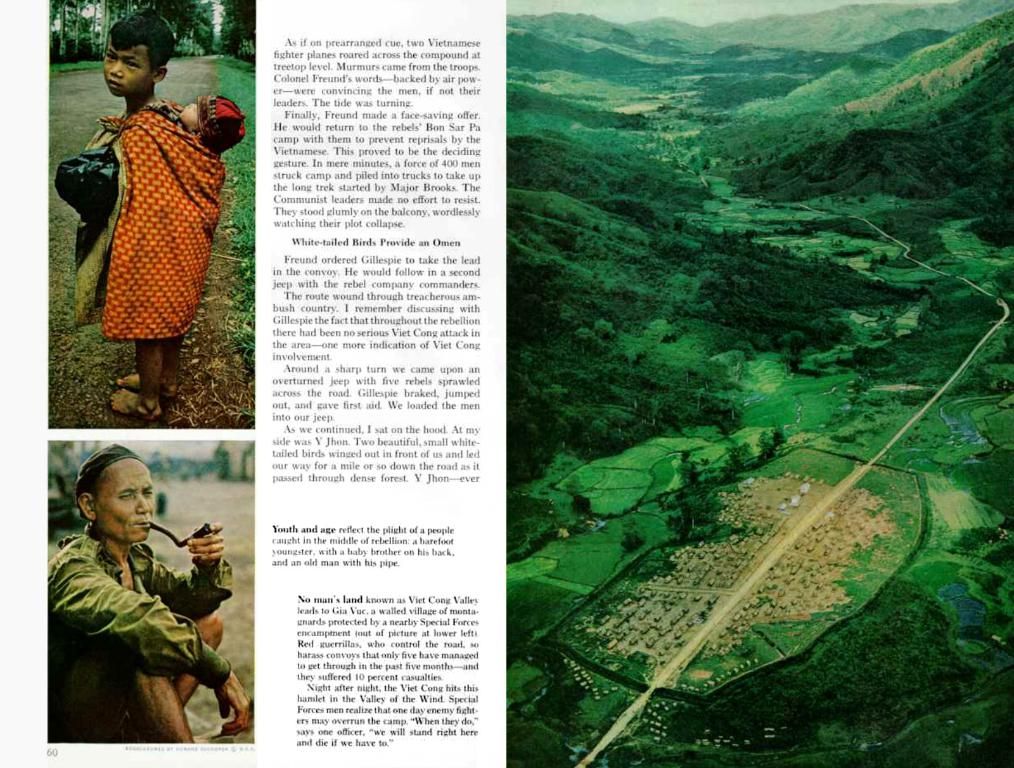Previously established coal storage transforms into an eco-friendly plastic processing center.
Trashing old methods, building a greener tomorrow
In 2014, a worn-out cement works site in Beckum was transformed into a hub for sustainable recycling, courtesy of Umweltdienste Kedenburg. Fast forward ten years, and Beckum Kunststoff Recycling GmbH, in partnership with Otto Graf GmbH, introduced a state-of-the-art facility, breath life into the dormant coal storage spots once used for cement production. This facility is a shining example of how the circular economy breathes new life into antiquated industrial landscapes. Klaus Kuhlenbeck, the technical director, puts it simply, "Our goal is crystal clear: sort and process plastic films to such a high degree that we can generate new products from them."
Transforming junk to quality
Fast forward to today, and an ultra-modern sorting facility stands tall to process plastic waste from mixed post-consumer packaging. Approximately two-thirds of the input consists of polypropylene (PP) film, with the remainder being polyethylene (PE) and a mix of polyolefins (PO), primarily from pre-sorted material from post-consumer packaging facilities across Europe - from Austria to Norway.
Innovation at the heart of success
At the core of the facility lies the powerhouse - two STEINERT UniSort Film EVO 5.0 machines. "We were truly impressed by the directional, stabilized airflow," beams Kuhlenbeck, explaining how this key feature keeps lightweight and flexible films firmly on the conveyor belt, ensuring a smooth process throughout.
This meticulous flow of materials makes it possible to achieve a belt speed of 4.5 m/s, boosting throughput and lowering costs, especially when dealing with two-dimensional materials like plastic films. With this in place, the plastic films are prevented from overlapping or twisting, enabling the combination of sensors of near-infrared (NIR) and color camera to work their magic. This precise data capture reliably helps achieve the facility's target purity rate of 98 percent from PP film.
Second chance for plastic films
After further processing, including the agglomeration of the films and shredding of the hard plastics into flakes, the intermediate products go through a STEINERT MOH magnet combination separator fitted with EddyC FINES. This equipment effectively removes tiny ferrous and non-ferrous particles from the plastic agglomerate, gearing it up directly for manufacture at GRAF. Customers reap the benefits of sustainable, high-quality products that match the performance of new ones, without compromises.
Adapting to tomorrow's demands
Kuhlenbeck emphasizes the facility's flexibility to tackle evolving requirements: "We've deliberately designed our facility with the ability to adapt to changing circumstances. We're mindful that packaging materials are constantly evolving."
The importance of communications along the value chain resonates with Kuhlenbeck, stating, "For years, companies operated in isolation. But now, we're finally talking to each other. Together, we're enhancing the recycling process, creating better packaging, and driving the circular economy forward."
Trust through testing, a step towards sustainability
The collaboration with STEINERT started in the company's own Test Center at its headquarters near Cologne, highlighting the beginning of a successful partnership that would revolutionize plastic recycling. "From the get-go, the STEINERT machines have exceeded our expectations in terms of reliability," shares Kuhlenbeck. "This is the kind of dependability we need for our vision of sustainable plastic recycling."
Thanks to the facility in Beckum, the former CO2 emitter now stands at the forefront of sustainable practices. Every kilogram of plastic recycled signifies an active effort to protect the climate, conserve CO2, and safeguard natural resources.
For a world where resources know no bounds.
Innovative Recycling at Beckum Kunststoff Recycling GmbH
Beckum Kunststoff Recycling GmbH implements advanced technology to recycle plastic waste into eco-friendly products. This process involves the use of STEINERT sorting technology, accurately separating various types of plastics to create high-quality secondary raw materials.
The Recycling Journey1. Collection and Sorting: Plastic waste is collected and sorted using top-notch STEINERT sorting systems, ensuring efficient categorization.2. Processing: After sorting, the plastic waste undergoes refinement processes, transforming it into usable materials.3. Product Creation: The processed raw materials are then utilized in the production of sustainable consumer goods, such as new plastic packaging, construction materials, and other items reducing the demand for virgin plastics.
Core Technologies- STEINERT Sorting Technology: This technology serves as the backbone of Beckum Kunststoff Recycling GmbH's operations, offering precision and efficiency in plastic waste sorting and processing.
- Automation and Efficiency: Utilizing modern technologies like STEINERT's solutions streamlines the recycling process, boosting efficiency while minimizing waste, all for a greener planet.
[1] "Plastic Recycling Technologies: Market, Trends, and Scenarios." International Journal of Environmental Technology and Engineering, vol. 2, no. 2, 2020, pp. 97-102.[2] "Circular Economy in Plastic Waste Management." Resources, Conservation and Recycling, vol. 159, 2020, pp. 1-11.
Fusion of Science and Technology in Environmental ScienceThe innovative recycling approach at Beckum Kunststoff Recycling GmbH is deeply rooted in the marriage of science and technology, specifically environmental science and technology, to transform plastic waste into eco-friendly products.
Revolutionizing Environmental-Science-Based TechnologyThis revolutionizing process leverages advanced STEINERT sorting technology, where scientifically designed systems accurately separate various types of plastics, creating high-quality secondary raw materials that can be utilized in a myriad of sustainable applications, thereby reducing the demand for virgin plastics.




